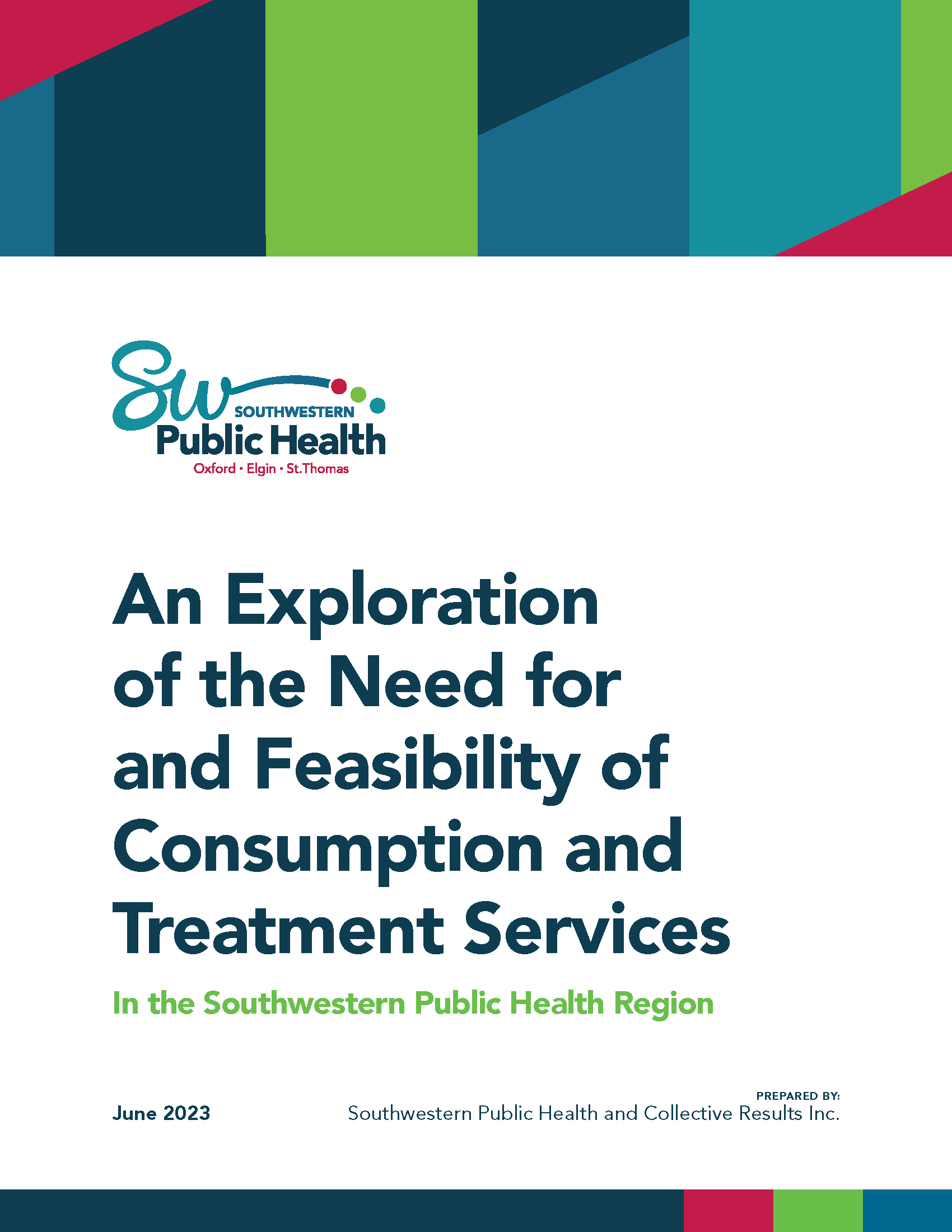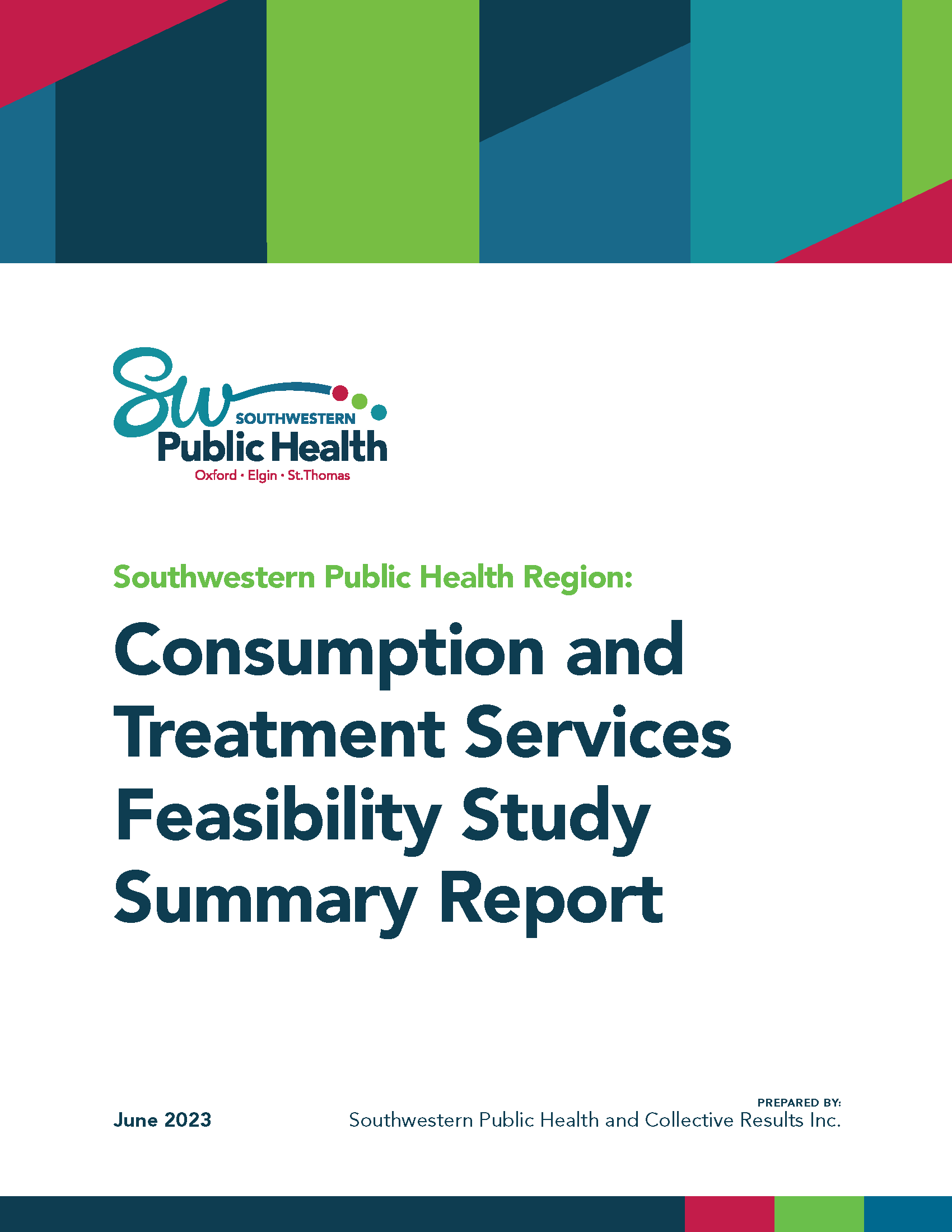Consumption and Treatment Services
History of this Work
We've had some important conversations.
A feasibility study was undertaken in the Southwestern Public Health region in early 2023 to analyze the perceived need, support, and service models available for Consumption and Treatment Services. On June 22, 2023, the SWPH Board of Health expressed a commitment to further explore the Consumption and Treatment Services recommendations outlined in the feasibility study.
What are Consumption and Treatment Services (CTS)?
Supervised consumption and treatment services provide a safe, clean space for people to bring their own drugs to use, in the presence of trained staff. These services prevent accidental overdose and reduce the spread of infectious diseases, such as HIV. Supervised consumption and treatment services offer a range of harm reduction services, such as sterile needle distribution and drug checking (making sure drugs aren't contaminated). CTS connect clients with health and social services, including substance use treatment, if they are ready.
What is a feasibility study?
In this scenario, a feasibility study was intended to learn what is wanted and what is possible in terms of Consumption and Treatment Services in Oxford County, Elgin County, and the City of St. Thomas. This study collected and analyzed data from Indigenous partners, people with lived experience of substance use (PWLE), community partners, political leaders, community members and business owners.
Our feasibility study had 3 goals:
- To determine if there is a perceived need for CTS
- To assess the buy-in and support of CTS
- To examine the models, operations, and practical components of offering CTS
Why is Southwestern Public Health involved in this work?
Public health's role is health promotion and health protection - and the health harms related to taking opioids (heroin, oxycodone, hydrocodone, morphine, methadone) have increased and continue to increase, across our region. These harms include deaths, infections, and overdoses requiring emergency services and hospitalization. The average number of monthly deaths from opioid overdoses have increased from 1.42 per month in 2019 to 3.83 per month in 2021.
Background
| What is harm reduction? |
| Harm reduction is a set of practical strategies and ideas aimed at reducing negative consequences associated with drug use. Harm reduction is centred on a belief in, and respect for, the rights of people who use drugs. Southwestern Public Health currently offers several harm reduction services: sterile supply distribution (needles and other supplies), naloxone training and distribution, safer drug use education, safe needle disposal, and education about safe needle disposal. |
| Are Consumption and Treatment Services legal? |
| Yes. In Canada, the legal operation of CTS requires Federal Government approval, granted by the federal Minister of Health for legal exemption under Section 56 of the Controlled Drugs and Substances Act (CDSA). |
| Tell me more about what happens within these services? |
|
CTS are a health care service site that allow people to use their own drugs accompanied by medically trained workers. Individuals are also provided with sterile consumption supplies (such as sterile needles), education on safer consumption, overdose prevention and intervention, medical and counselling services, and referrals to drug treatment, housing, income support, and other services. |
| What are the benefits of Consumption and Treatment Services? |
|
There are four main goals:
|
|
Who was involved in your study and why? |
|
The British Columbia Centre on Substance Use Guide to Supervised Consumption Services Operations recommends that communities interested in exploring CTS speak with m any different groups in the community such as people with lived experience (PWLE are people who use substances or who used substances in the past), community members, community partners, local service providers, and policy markers. It is imperative to speak to these groups prior to applying for exemption or funding.
The combined perspectives of these groups help us understand if this is a service that is considered wanted, needed and possible in our region. As the people who would use potential CTS in the region, the information we learn from PWLE is very important. This group may highlight perspectives or issues that other community partners are not aware of. Community partners, including indigenous partners, also provide a vital perspective as the population that supports and interactives with PWLE on a regular basis.
Understanding municipal partners’ perspectives are key to understanding local politicians and the perspectives of those who provide municipal services. Finally, data gathered from the general community will help determine local support for CTS and what type of education and support would be needed to set the CTS up for success if the process moves forward. |
Want to stay in touch?
If you are interested in this work and want to be informed about new developments, please sign up for our email distribution list.













